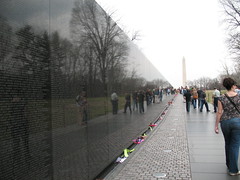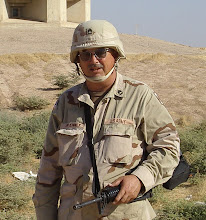 Image by Kim Smith via Flickr
Image by Kim Smith via Flickr
I would say that from sixth grade until High School graduation were my "missing years." For a very long time I didn't like me, I didn't like school, I didn't like being at home and I pretty much didn't like anything except band classes and being with my friends in the band.
Things got better when I was introduced into the 601st Militia. The "601" was where, by playing, I began to grow up. There's nothing like a bullet whizzing past you that wakes you up and makes the world a sweeter place to live in. It makes a whirring-buzzing-zinging that isn't fairly represented by the background noise in movies. A bullet in the air near you has a real presence and once you hear one you'll know what I'm talking about. Going on raids with my group was a lot like "playing war" with a good dose of reality wrapped up in it. It is really a good thing that we did not have access to stable explosives.
Things got really better when I met Patricia Anne Langley. How we could have existed for so many years, living 3 miles from each other, being in the same grade level at school and sometimes riding the same bus is almost astonishing. But, in my senior year at Greenwood High I went to a Christmas party and there she was! We dated and by March we were "going steady."
Pat has always been the rock that I could depend upon to steady me and keep me going when I would rather not. She is a jewel of great value and anything that I have accomplished in life tracks back to my love for her. Pat is a quiet, loving wife, mother and grand-mother whose very presence nourishes our lives.
We went steady for over three years and married on June 2, 1968. Pat taught school while I worked in the mill and continued my education. While I was working over 56 hours a week on varied shifts in the mill, trying to run a farm with 135 head of cattle and taking 18 hours of classes at Lander we managed to see one another once in a while.
Remember that in 1968 the war in Viet Nam was already hot and getting hotter. If you didn't have a real good reason; your draft classification was 1-A and within a month a letter came in the mail indicating that your friends and neighbors had chosen you to be inducted into the military for two years of involuntary service. Everybody dreaded that letter and did what they could to avoid being drafted.
Instead of going into the draft, you could join the National Guard or the Reserves. So I drove down to the National Guard armory and noted that the line for volunteers was several blocks long. There were only 10 openings... Going back to the Canteen at Lander to participate in my morning game of poker; I ran into the friendly Air Force recruiter. He said, "How would you like to be up in the air dropping bombs on the
Viet Cong instead of in the jungle smelling them?" I said OK and the first thing I knew, I was sworn in to the United States Air Force with a reporting date of July 3, 1969. The missing years were then over. I remember everything from that day forward.
 Image by stevesheriw via Flickr
Image by stevesheriw via Flickr
![Reblog this post [with Zemanta]](http://img.zemanta.com/reblog_e.png?x-id=efaffdcb-bc03-40cb-a87e-caefe8e211d9)

![Reblog this post [with Zemanta]](http://img.zemanta.com/reblog_e.png?x-id=21d080cf-85ce-4df3-b803-b5ef0c901362)
![[Cossack man from the steppes of Russia.]](http://farm4.static.flickr.com/3149/3109329109_1997a6c705_m.jpg)
![Reblog this post [with Zemanta]](http://img.zemanta.com/reblog_e.png?x-id=be3e6e7f-e23c-437d-8b22-97551be66e49)

![Reblog this post [with Zemanta]](http://img.zemanta.com/reblog_e.png?x-id=a268dfd0-0f25-4bd0-ad8b-36269e1762d8)

![Reblog this post [with Zemanta]](http://img.zemanta.com/reblog_e.png?x-id=7ce531ef-5699-473b-b6fa-c6e1c3f33eff)

![Reblog this post [with Zemanta]](http://img.zemanta.com/reblog_e.png?x-id=fcca7edc-d3f8-43f0-9d38-54bc038e8633)

![Reblog this post [with Zemanta]](http://img.zemanta.com/reblog_e.png?x-id=6d73bcd8-01d1-4b1c-87b8-1be3b910023b)